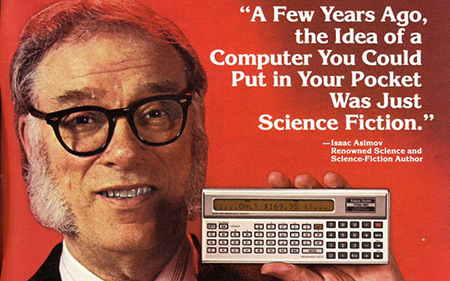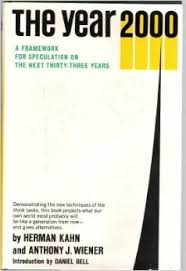I got a number of comments which were surprisingly positive. I try to be provocative, which often leads to some people being rather vocal in their disagreement. Not this time or at least so far.
 One reader suggested I give my predictions for 2064 after reading a link I posted on Isaac Asimov’s predictions for 2014 which were made in 1964. You can read what he had to say here. Asimov was very much on the mark but then, as a science fiction writer, it was his job to think about the future.
One reader suggested I give my predictions for 2064 after reading a link I posted on Isaac Asimov’s predictions for 2014 which were made in 1964. You can read what he had to say here. Asimov was very much on the mark but then, as a science fiction writer, it was his job to think about the future.
 The Best Business Idea for the last Ten Years
The Best Business Idea for the last Ten Years
The readers request reminded me that, in 2006, Fast Company Magazine asked me and nine others to name what we thought was the most important business idea for the next ten years.
I answered at first, that I was not sure what the most important business idea was for the last ten years. I was only half joking. I said the most important business idea for the period 2006-2016 was the end of time and space, meaning people would work where they wanted to work when they wanted to work and work would take place all over the planet at any time. You can read a post I wrote about that interview here. It also links to the Fast Company piece.
In 1967, I read a book by Herman Kahn of the Rand Corporation called The Year 2000. It had a lot of impact on my thinking. I had been a student of history since I was eight years old and introduced to the History of the World by by H.G. Wells. After reading Kahn’s book, I realized that it might also be possible to write the history of the future.
Kahn, was right about a lot of things. But wrong about one thing in particular. He thought that the use of nuclear energy would create an abundance of cheap energy which would impact all sectors of life including the production of food. He could not predict that 12 years later, the accident at Three Mile Island would change the direction of energy production away from nuclear, and that our reliance on fossil fuel would see continuous rising costs of energy. Both of which would have a very negative impact on economic development. I have included some of Kahn’s predication at the end of this post.
Stepping back to 1964
In thinking about the next fifty years, I found myself thinking back to 1964 when I was just 19 years old. I wondered what I would I have predicted back then about technology in the years 2014. Frankly, I don’t think I could imagine 2014 even happening. I would have had difficulty with the year 2000 and the fact that I would be 55 years old then.
In 1964, my life revolved around the girl I loved, the war I hated, the injustice I hated, the music I loved and some occasional recreational drugs. It was the year that the Beatles came to America. But it was also the year that IBM announced the legionary IBM/360 main frame computer. Gas cost 30 cents a gallon and the average new car would set you back $3,500. That year the Dow Jones closed at 874.
So lets imagine that I understood technology and wanted to make predictions. What would have been the factors that would have affected my thinking? By the way, only two years later, in 1966, I began to actually work with computer technology.
I have been thinking of writing a book or teaching a course called The Future History of Technology, an Historical Perspective of the Future. So lets think about what a young Avram Miller would have known and thought about technology in 1964.
I would have been aware of the transistor, and certainly had a transistor radio, and perhaps would have known about the first work that was being done in semiconductor technology. I may have read the article in which Gordon Moore, the co-founder of Intel, introduced Moore’s law, but I don’t know if I would have been able to comprehend what that law really meant.
Time Sharing would have played a big role in my thinking. In 1964, the airline reservation system was introduced. Now, there were reservation agents that spent their entire work day using computers.
I would definitely have been aware of the picture phone which AT&T had been demonstrating publicly. I would have probably thought that picture phone would be the way many if not most people communicated remotely within a decade.
Technology I may have been aware of:
Perhaps, I would have known about citizen band radio but probably would not have extrapolated that to the cellphone. By the way, 1964 was the first year that touch tone telephones were introduced at that time they only had ten keys. The # and * would be added later. I may have heard about the first handheld electronic calculators but I doubt that I could have extrapolated those to today’s mobile devices.
I could have known about Digital Equipments first computer, the PDP-1 and may have perhaps seen its graphic display and played one of the first computer games, Spacewars on it.
 Technology I might not have been aware of:
Technology I might not have been aware of:
While I would have been aware of Cobol and Fortran as programing languages I doubt that I would not have known that Basic was being developed at Dartmouth.
While the the precursors of computer networking were being developed around this time. I don’t think I would have been aware of it.
I don’t think I would have been aware of the development of the first mouse at SRI in 1964 but I did get to pay with one in 1967.
I would not have been aware of the early developments in fiber optic communication.
Avram rises to the challenge
To be honest, I think that if I was asked to predict the future of technology in 2014 back in 1964, I would have talked about Robots, self driving cars, and picture phones.
The pace of technology development is increasing. Looking back at the last 50 years, I have to say that I doubt that I can predict the next 50 years but I am willing to give it a go since I will probably not be around to see how badly I did. So look for my next blog post, Technology in 2064.
Appendix
Evolution of Key Technologies
I have listed some of the key technologies of 1964 and what I think they evolved into
Transistor SemiConductors (including CPU, GPU, Flash)
Time Sharing Distributed Computing/Cloud
Modems/Fax Machine Broadband, ethernet
Microwave Wifi, 5g
Basic HTML/Java Script
First Mouse Touch Screens
Computer CRTs Flat Panels
Handheld Calculator Mobile Computing Devices
Coax Cable Fiber Optics
Passwords Encryption/bio metrics
AI/Robots AI/Robots
Some Prediction from The Year 2000 By Herman Kahn and Anthony Wiener
In 1967, Herman Kahn and Anthony J. Wiener published The Year 2000: A Framework for Speculation on the Next Thirty-Three Years, which included contributions from staff members of the Hudson Institute and an introduction by Daniel Bell. Table XVIII in the document[5] contains a list called “One Hundred Technical Innovations Very Likely in the Last Third of the Twentieth Century”. The first ten predictions were:
Here are the first ten
1. Multiple applications of lasers.
2. Extreme high-strength structural materials.
3. New or improved super-performance fabrics.
4. New or improved materials for equipment and appliances.
5. New airborne vehicles (ground-effect vehicles, giant or supersonic jets, VTOL, STOL).
6. Extensive commercial applications of shaped-charge explosives.
7. More reliable and longer-range weather forecasting.
8. Extensive and/or intensive expansion of tropical agriculture and forestry.
9. New sources of power for fixed installations.
10. New sources of power for ground transportation.
The remaining ninety predictions included:
26. Widespread use of nuclear reactors for power.
38. New techniques for cheap and reliable birth control.
41. Improved capability to change sex of children and/or adults.
57. Automated universal (real-time) credit, audit and banking systems.
67. Commercial extraction of oil from shale.
74. Pervasive business use of computers.
81. Personal pagers (perhaps even pocket phones).
84. Home computers to “run” households and communicate with the outside world.
Arthur C. Clark 1964 on the future in 2014



Avram is another blogger I follow. He is a true genius and has an ego as high as his IQ. He doesn’t suffer fools at all. That having been said, he knows more about the direction of tech than anyone else I know including all of the analysts.
UB
LikeLike
Really enjoyable retrospectives of Arthur C Clarke’s and Asimov’s predictions! I’m looking forward to YOURS :-).
As with Kahn’s predictions, what actually seems to happen is a significant difference between what we are capable of doing versus what we do – as societies.
I have more “hopes” than predictions per se – some are: **cheap renewable (and storable) energy available worldwide (such as efficient solar/algae/water-motion energy collectors and some kind of battery).
** easy, inexpensive and pervasive tech for potable water collection/storage/cleanup/re-use.
** intensive non-toxic agriculture to produce nutritious and tasty foods with minimum manpower.
** more engaging, effective and useful educational systems available to all ages – globally on demand.
** system/s to recover and re-use garbage now in landfills, as well as fully recycle con temporarily produced waste products.
Ahhh, yes, I’d also like to have Rosie (the Jetson’s robot maid) available to clean up my house regularly :-)… Most likely she will speak Japanese but thanks to some new Google-acquired company I’ll probably be able to select to have a reasonable translation to a language I understand…
This is fun – Thanks Avram!
LikeLike